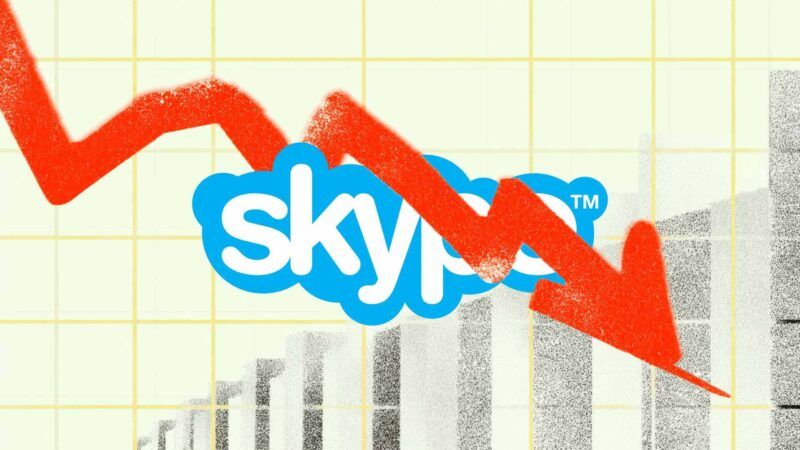Skype's Shutdown Proves Bigger Isn't Always Better
The death of a onetime powerhouse carries a lesson for antitrust enforcers—if they’ll listen.

Skype's consumer service was shut down by its parent company Microsoft on Monday. Though President Donald Trump's overzealous antitrust enforcers think popular platforms with large user bases imbue firms with incontestable market power, the rise and fall of Skype contradicts this theory. Federal trustbusters should keep this case in mind before deeming Big Tech companies monopolies, breaking them up, and decreasing American innovation, growth, and dynamism.
Skype launched in 2003 and had 150 million monthly users by the time of its acquisition in 2011. Microsoft bought the internet calling service for $12 billion in inflation-adjusted dollars in May 2011, which the Federal Trade Commission (FTC) approved in June of that year. Salvatore Cantale, a professor of finance at INSEAD, a global business school, explained in 2013 that Microsoft paid "roughly ten times Skype's revenues in 2010 [and] around twice its recent valuation."
Some argue that Microsoft paid so much for Skype because it anticipated that doing so would corner the videoconferencing market, ensuring a profit. By 2020, Skype had grown to 32.4 percent of the global market, making it not a monopoly per se but the single largest firm in the videoconferencing space. The COVID-19 pandemic dramatically increased demand for videoconferencing—not just between family members, friends, or parties of gamers but for workplaces and classrooms.
Considering the network effects—which Reason's Elizabeth Nolan Brown explains as the advantages that accrue to tech platforms that already have a strong user base—experienced by telecommunications services, many would predict that this dramatic increase in demand would increase Skype's market share as new users flocked to the most-used videoconferencing platform. But the opposite happened: In 2021, Skype's market share fell to a measly 6 percent while Zoom's skyrocketed to nearly 50 percent. Skype's market share recovered only seven percentage points by 2024 and was discontinued by Microsoft, which transitioned accounts to Microsoft Teams, an application that facilitates workplace communication and collaboration.
Antitrust enforcers at home and abroad castigate Big Tech for leveraging network effects to maintain their market power. The FTC is currently prosecuting Meta, which the Commission claims violated the Sherman Antitrust Act by monopolizing social media services through its acquisitions of WhatsApp and Instagram. Meanwhile, the European Union has fined the company hundreds of millions of dollars for its "pay or consent" model of Instagram and fined it for tying Facebook Marketplace to Facebook.
While these companies, like all companies, would certainly like network effects to work as an unfordable competitive moat, they do not. The case of Skype, like those of Yahoo, MySpace, and AOL, is proof that network effects are insufficient to insulate a firm from market competition indefinitely.


Show Comments (28)